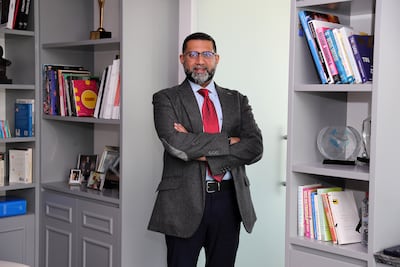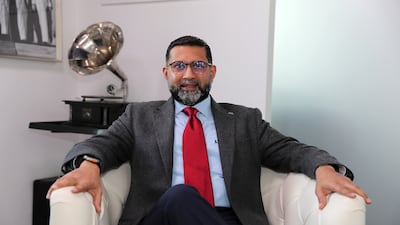Shamsh Hadi is co-founder and chief executive of ZorroSign, a platform using artificial intelligence and blockchain to deliver secure digital signatures, digital document transactions and fraud detection for businesses.
Born in the US and partly educated in Canada, he has spent 20 years in Dubai where his family has had a presence since 1962.
Mr Hadi worked with a property developer and management company, an escrow and title company, and an IT consultancy before launching ZorroSign, his third technology venture, in 2019.
Aged 40, he lives with his wife and two children in Al Jafiliya, Dubai.
How did your family earn growing up?
I was born in California and around two years old moved to Hong Kong. We come from very humble beginnings.
My grandfather left his village in India with only the clothes on his back, his ultimate goal (was) to reach the US. He ended up coming to Dubai, but did bring the family to the US in the 1970s.
Our traditional family business was watches and electronics. My dad was the generation that made some wealth and now it is up to the third generation of businessmen to deplete the wealth or make it bigger. I am trying hard to do the latter.
Did money figure in your childhood?
I spent 11 years in Hong Kong, two years in boarding school in Singapore and Toronto, and moved here at 14.
We were told to live humbly, were never spoilt. I didn’t know the concept of money initially. But when I grew older, any pocket money we were given, we were told to take some for savings, some for charity.
We were encouraged not to spend if not needed. That was a key life lesson.
In Singapore, I used to get 25 Singapore dollars a week. If I spent, I would show my head of house my accounting and the change with receipts. I could not be off by a cent.
The value of money was instilled early on.
When did you first get paid?
I went to university in Toronto on an IBM scholarship. Over summer, I took an internship, a three-month contract. I finished everything in a month and a half, but still got paid for three, about Dh5,000. I remember immediately saving that.
I was given pocket money up to graduating. After that, I needed to fend for myself.
I worked at a convenience store. I also spent a year in Vancouver at a luxury senior retirement home company.
Why turn to technology?
I have been a techie at heart from day one. I give credit to my first computer when I was around 10, an IBM 286.
I learnt from my dad to be very hands on, so decided to break open the computer but didn’t write down how to put it back. I learnt an expensive lesson and from there have been passionate about technology.
I started my first technology company, in hotels and hospitality. My next technology venture, which I moved to the US, provided after-school tutoring to pupils in underperforming schools.
What is your spending and saving strategy?
I am a saver, unless I spend on experiences for family and myself.
Over summer, we watched sports events in the US and Canada. I love good food, travel, so I am happy to spend on that, but I don’t go crazy.
My travel experiences cultivated who I am and for the kids, giving them those experiences … toys end up stuck in the cupboard once interest dies down, but you still hear them speak about going on safari.

How do you grow personal wealth?
Stocks in different parts of the world. I have invested in cryptocurrency, but not put in my life savings.
One of my philosophies is that I will win, slowly but surely, because I take calculated risks. I ensure there is a balance of cash available and investments made.
What is your best investment?
In myself and my education.
Money comes and goes, as do your house and car, but if you have good health and education, it is something nobody can take from you.
Any key financial milestones?
My first property transaction; we built labour accommodation in Al Quoz for people building the Dubai Metro (from 2007 to 2008).
We returned 300 per cent to every investor in a span of eight months. Part of it was bank financing and we paid them back early.
It was part of the family (business), but was my project. It gave me confidence, experience and a great platform to have some liquidity.
Why ZorroSign?
I saw blockchain would be the best way to protect data, so I built a digital security platform.
We (then) built ZorroSign off that as the world’s first digital signature company on the blockchain.
co-founder and chief executive of ZorroSign
We have patented fraud detection as part of our solution. We are all sending documents to an email address or phone number to sign … we don’t know who’s on the other side.
People saw big value in privacy, security and authenticating users, then Covid hit, everyone wanted to go online overnight and that is when things really happened for us.
Has success made you wealthy?
I am wealthy in my own right, but if I compare myself to the guy next door, I am relatively poorer than him.
The direct answer is, I do consider myself wealthy, (but) I don’t think I have changed my lifestyle; which class to fly on Emirates, which cars I start rolling around in. That is not the type of person I am.
It has allowed us to look at different investments, like art and other things, that have meaning to us.
Any cherished purchases?
The highest level of health insurance. My dad had a stroke two years ago, with a one-in-10 chance of survival.
Dubai has some of the best health care, Bupa (UK provider) didn’t let us worry about anything and he came out healthy.
I don’t know how life would have been without that.
What do you think of money?
It is transitory. We need it to survive. Money does not buy you happiness. How much good you do with it is important.
If you are a good human being, follow good ethics, morals … knowing a person I am able to relate to that way rather than what is in their bank account is more enticing.
Any advice for your younger self?
Save for that rainy day. Invest in yourself, be fearless.
Try to explore whatever you can. Try not to borrow because that is one of the fastest routes to failure. Try not to pay interest.
Any spending weaknesses?
The only thing I splurge on physically is technology. I will always have the latest iPhone. I need it for work, I am in a tech company … I can use that as an excuse.
There are instances in the version of me yesterday, today and tomorrow that will spend on what I have potentially not needed. I wouldn’t change it because those experiences help build you.
What are your financial goals?
To achieve financial success. And to allow my family to experience everything they want without the worry of money.
The retirement plan builds off the same story; generate enough wealth that we will be able to do what we want every day, and not worry if we can afford it or not.

